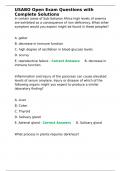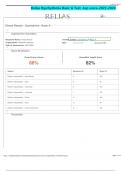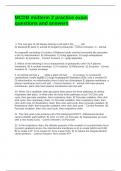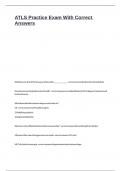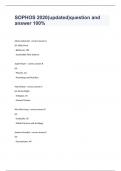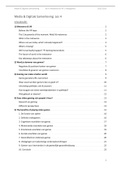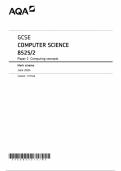1.3 Statistics
Introduction lecture (1):
➔ Traditional sources of knowledge: no critical assessment!
◆ Intuition
◆ Tradition
◆ Authority (teacher, professor etc)
➔ Reasoning based on arguments and logic: premises might be wrong!
➔ Empiricism: based on personal experience, can lead to confirmation bias (filtering
knowledge that fits their already existing pov)
➔ Systematic empiricism: science!
➔ Goals of science:
◆ Description
◆ Explanation
◆ Prediction
◆ Control: influencing experimental conditions to draw causal conclusions
➔ Characteristics of empirical science:
◆ Assumption of an objective truth
◆ Empirical cycle
◆ Testable & falsifiable questions
◆ Requires clear operational definitions
◆ Self-correcting via replication studies
➔ Critical thinking:
◆ credibility/reliability of the sources?
◆ evidence/counterevidence?
◆ Other plausible alternative explanations
,Passer Chapter 1:
➔ The Three Door Problem: ⅔ odds of winning the car if she switches
➔ Sources of knowledge:
◆ Tenacity:
● knowing by force of habit
● No considering opposing arguments
● May be right, but a poor way to obtain knowledge
◆ Authority:
● Relying on other people as source of knowledge and beliefs
● Parents, teachers, friends, books, TV etc.
● credibility= perceived trustworthiness + expertise
● Many dangers of uncritically relying on authority
◆ Reason:
● Use of logic and rational argument to reach conclusions
● One limitation is that different conclusions can be reached depending on
the premises we start with, and they would all be logically valid even if
not actually accurate
● Can’t solely rely on logic to understand things like human behavior or
feelings, but useful in problems of probabilities and logic etc.
◆ Empiricism:
● Acquiring knowledge directly through observation and experience
● Many limitations in its raw and personal form:
○ No one can directly experience everything
○ Our own experience may not be representative of other people’s
experiences/ general state of affairs
○ We may interpret or remember our experiences in a biased
manner
◆ Confirmation bias: selecting information that complies to
our already existing beliefs
◆ Science:
● Relies on systematic empiricism to answer questions and test ideas
○ Requires empirical evidence: reason or authority is insufficient
○ Empirical evidence is gathered and interpreted according to some
system or plan
○ Reasoning is needed to evaluate evidence and drawing
conclusions
,➔ Goals of science:
◆ Description:
● Describe phenomena (qualities and relations etc.)
◆ Explanation:
● Hypothesis: initial and tentative propositions that aim to explain how
certain variables are related → takes into account relevant existing
knowledge and uses reasoning, and then are subject to empirical testing
● Theories: as empirical evidence accumulates, scientists form a set of
formal statements that specifies how and why variables or events are
related → broader than hypotheses
● Explaining behavior is very complex because:
○ There are many different perspectives within psychology
(environmental, biological, cognitive etc.)
○ There are many causes that affect behavior simultaneously
○ In a causal chain of interrelated events, there are both distal
causes (remote causes) and proximal causes (immediate causes)
○ Covariation, temporal order and absence of other plausible
explanations are all needed to establish a causal relationship
between variables X and Y
◆ Prediction:
● Used in hypothesis and theory testing
● Practical application: We can also use causal relationships or associations
between variables to predict real life events→smoking-lung cancer link,
high school success-college success
◆ Control:
● Control in research: choosing which variables and subjects to study, which
methods and procedures to follow, manipulating variables, keeping other
variables constant etc
● Practical application: using knowledge gathered from research to improve
people’s lives and the world
➔ Characteristics of science:
◆ Involves assumptions:
1. Events are not random and demonstrate a regular pattern
2. These patterns have underlying causes
3. It is possible to discover these causes
, ◆ Is empirical and systematic
◆ Focuses on empirically testable questions
● Falsifiability: even when we cannot prove a claim, we should be able to
disprove it
◆ Strives for accuracy and objectivity
● There are precautionary procedures to minimize the impacts of personal
biases when scientists collect data
◆ Clear definitions and operationalism
● Terms and concepts should be clearly defined, at least within the study
even if there is disagreement within the scientific community
● Operationism: defining a concept in terms of the specific procedures used
to represent it
○ Ex: romantic love consists of mutual feelings and monogamous
relationships, aggression consists of verbal and physical abuse etc.
◆ Involves public reporting:
1. For body of scientific knowledge about the topic to grow
2. For other scientists to be able to evaluate the claim made based on the
available research information
3. Enables other researchers to repeat the original study
● Peer reviewed journals: a professional journal in which scientific papers
submitted first undergo a process evaluation in terms of quality and
importance by several experts
◆ Scientific knowledge is tentative, not absolute
● Scientists are reluctant to say that evidence proves sth to be true because
new information can always contradict or qualify (set limits upon) current
beliefs
◆ Is self-correcting:
● New knowledge and discoveries can correct, discard or modify old
knowledge
● Replication: repeating a scientific study to determine whether the original
findings would still hold
○ If replication fails to replicate the original results, it may bring
doubt over the validity of the original study and call for additional
research.
◆ Has limitations
● Not the sole source of knowledge and cannot explain all kinds of
questions concerning value judgements, moral questions, faith etc.
Introduction lecture (1):
➔ Traditional sources of knowledge: no critical assessment!
◆ Intuition
◆ Tradition
◆ Authority (teacher, professor etc)
➔ Reasoning based on arguments and logic: premises might be wrong!
➔ Empiricism: based on personal experience, can lead to confirmation bias (filtering
knowledge that fits their already existing pov)
➔ Systematic empiricism: science!
➔ Goals of science:
◆ Description
◆ Explanation
◆ Prediction
◆ Control: influencing experimental conditions to draw causal conclusions
➔ Characteristics of empirical science:
◆ Assumption of an objective truth
◆ Empirical cycle
◆ Testable & falsifiable questions
◆ Requires clear operational definitions
◆ Self-correcting via replication studies
➔ Critical thinking:
◆ credibility/reliability of the sources?
◆ evidence/counterevidence?
◆ Other plausible alternative explanations
,Passer Chapter 1:
➔ The Three Door Problem: ⅔ odds of winning the car if she switches
➔ Sources of knowledge:
◆ Tenacity:
● knowing by force of habit
● No considering opposing arguments
● May be right, but a poor way to obtain knowledge
◆ Authority:
● Relying on other people as source of knowledge and beliefs
● Parents, teachers, friends, books, TV etc.
● credibility= perceived trustworthiness + expertise
● Many dangers of uncritically relying on authority
◆ Reason:
● Use of logic and rational argument to reach conclusions
● One limitation is that different conclusions can be reached depending on
the premises we start with, and they would all be logically valid even if
not actually accurate
● Can’t solely rely on logic to understand things like human behavior or
feelings, but useful in problems of probabilities and logic etc.
◆ Empiricism:
● Acquiring knowledge directly through observation and experience
● Many limitations in its raw and personal form:
○ No one can directly experience everything
○ Our own experience may not be representative of other people’s
experiences/ general state of affairs
○ We may interpret or remember our experiences in a biased
manner
◆ Confirmation bias: selecting information that complies to
our already existing beliefs
◆ Science:
● Relies on systematic empiricism to answer questions and test ideas
○ Requires empirical evidence: reason or authority is insufficient
○ Empirical evidence is gathered and interpreted according to some
system or plan
○ Reasoning is needed to evaluate evidence and drawing
conclusions
,➔ Goals of science:
◆ Description:
● Describe phenomena (qualities and relations etc.)
◆ Explanation:
● Hypothesis: initial and tentative propositions that aim to explain how
certain variables are related → takes into account relevant existing
knowledge and uses reasoning, and then are subject to empirical testing
● Theories: as empirical evidence accumulates, scientists form a set of
formal statements that specifies how and why variables or events are
related → broader than hypotheses
● Explaining behavior is very complex because:
○ There are many different perspectives within psychology
(environmental, biological, cognitive etc.)
○ There are many causes that affect behavior simultaneously
○ In a causal chain of interrelated events, there are both distal
causes (remote causes) and proximal causes (immediate causes)
○ Covariation, temporal order and absence of other plausible
explanations are all needed to establish a causal relationship
between variables X and Y
◆ Prediction:
● Used in hypothesis and theory testing
● Practical application: We can also use causal relationships or associations
between variables to predict real life events→smoking-lung cancer link,
high school success-college success
◆ Control:
● Control in research: choosing which variables and subjects to study, which
methods and procedures to follow, manipulating variables, keeping other
variables constant etc
● Practical application: using knowledge gathered from research to improve
people’s lives and the world
➔ Characteristics of science:
◆ Involves assumptions:
1. Events are not random and demonstrate a regular pattern
2. These patterns have underlying causes
3. It is possible to discover these causes
, ◆ Is empirical and systematic
◆ Focuses on empirically testable questions
● Falsifiability: even when we cannot prove a claim, we should be able to
disprove it
◆ Strives for accuracy and objectivity
● There are precautionary procedures to minimize the impacts of personal
biases when scientists collect data
◆ Clear definitions and operationalism
● Terms and concepts should be clearly defined, at least within the study
even if there is disagreement within the scientific community
● Operationism: defining a concept in terms of the specific procedures used
to represent it
○ Ex: romantic love consists of mutual feelings and monogamous
relationships, aggression consists of verbal and physical abuse etc.
◆ Involves public reporting:
1. For body of scientific knowledge about the topic to grow
2. For other scientists to be able to evaluate the claim made based on the
available research information
3. Enables other researchers to repeat the original study
● Peer reviewed journals: a professional journal in which scientific papers
submitted first undergo a process evaluation in terms of quality and
importance by several experts
◆ Scientific knowledge is tentative, not absolute
● Scientists are reluctant to say that evidence proves sth to be true because
new information can always contradict or qualify (set limits upon) current
beliefs
◆ Is self-correcting:
● New knowledge and discoveries can correct, discard or modify old
knowledge
● Replication: repeating a scientific study to determine whether the original
findings would still hold
○ If replication fails to replicate the original results, it may bring
doubt over the validity of the original study and call for additional
research.
◆ Has limitations
● Not the sole source of knowledge and cannot explain all kinds of
questions concerning value judgements, moral questions, faith etc.


